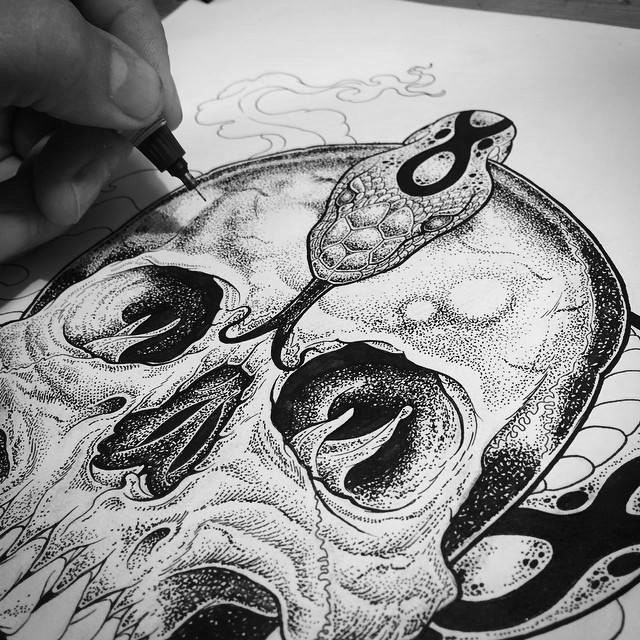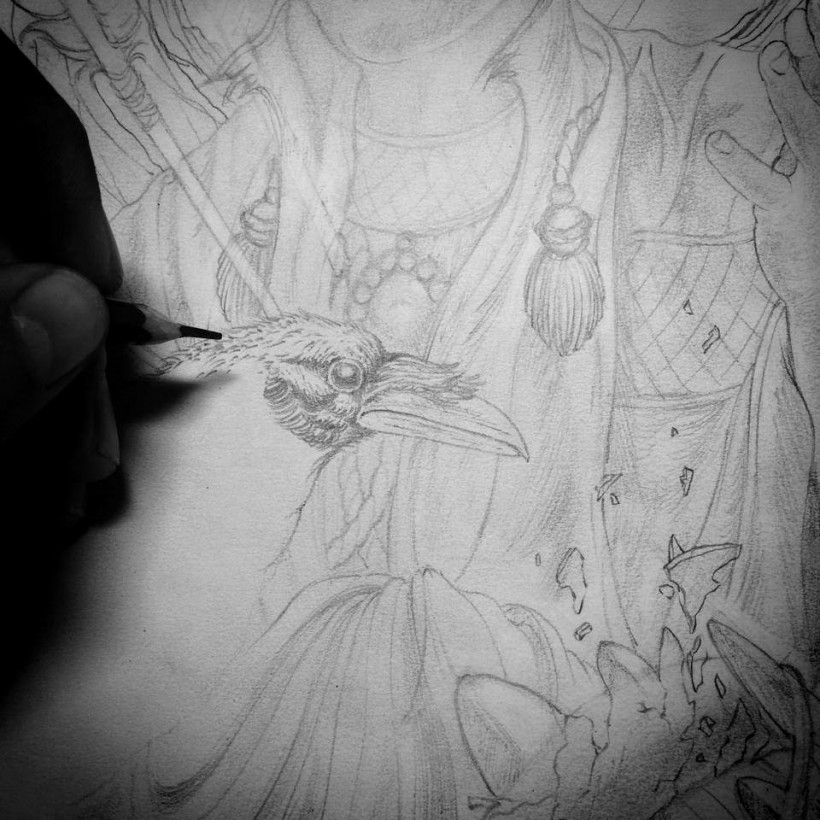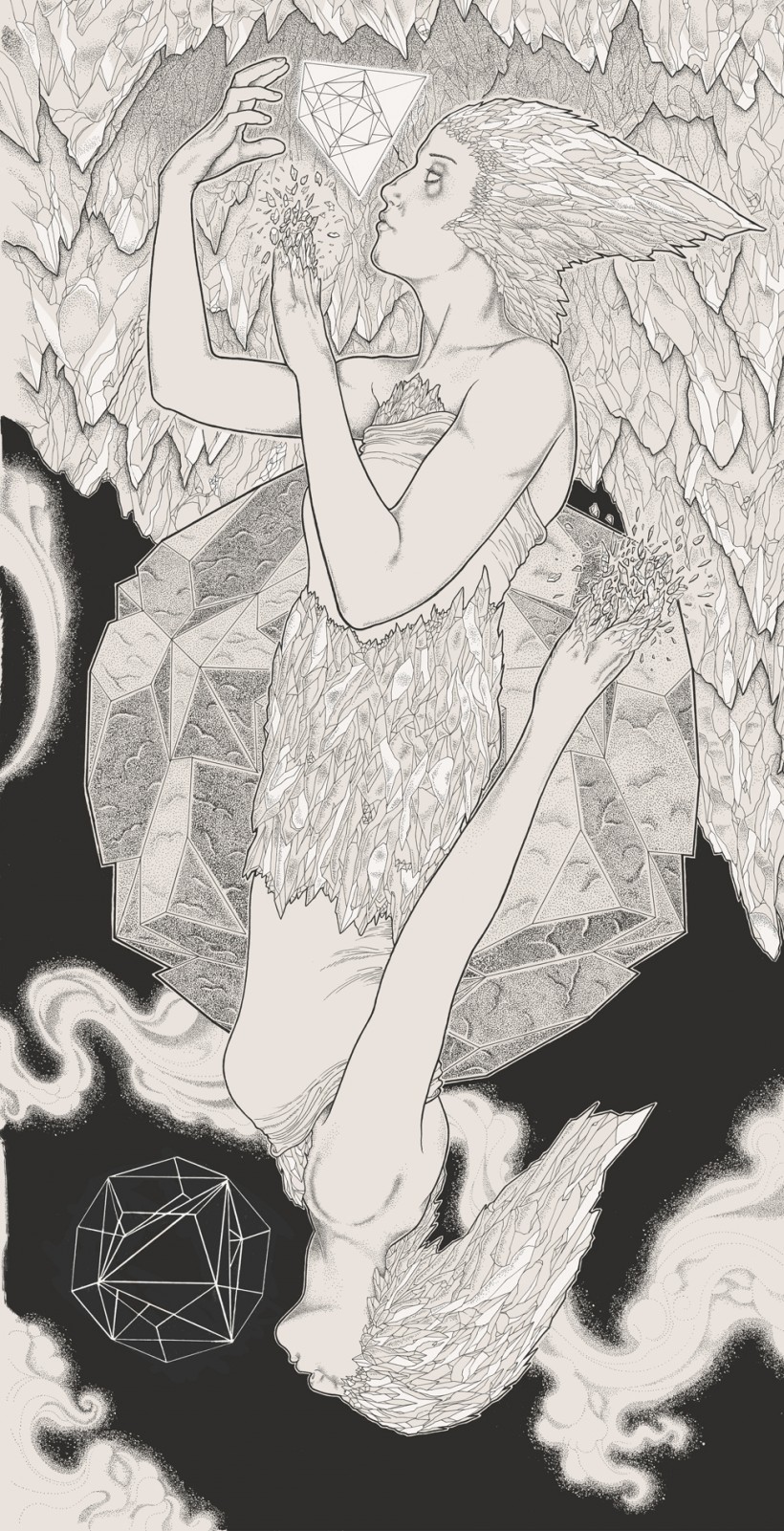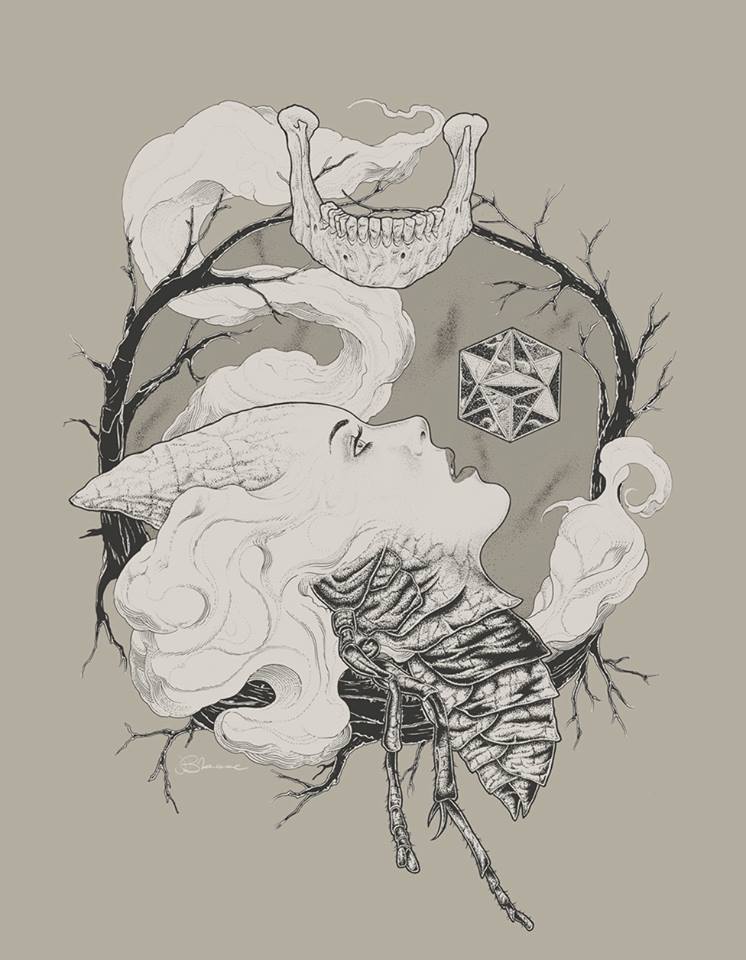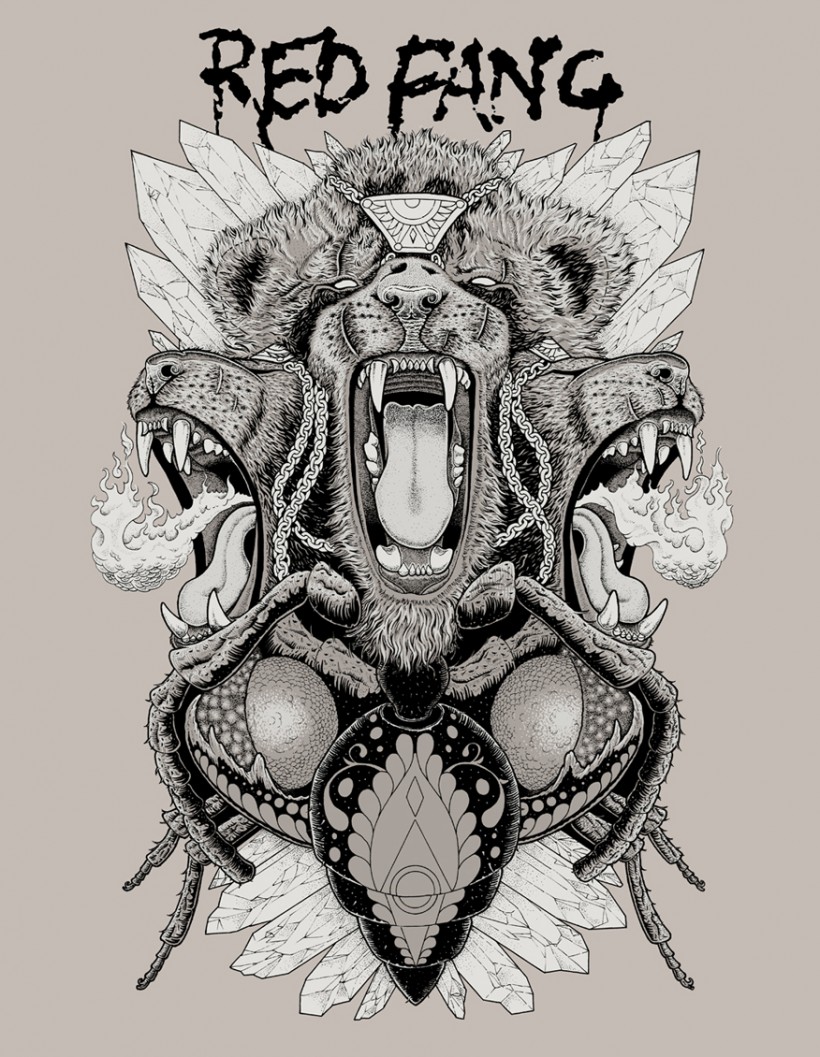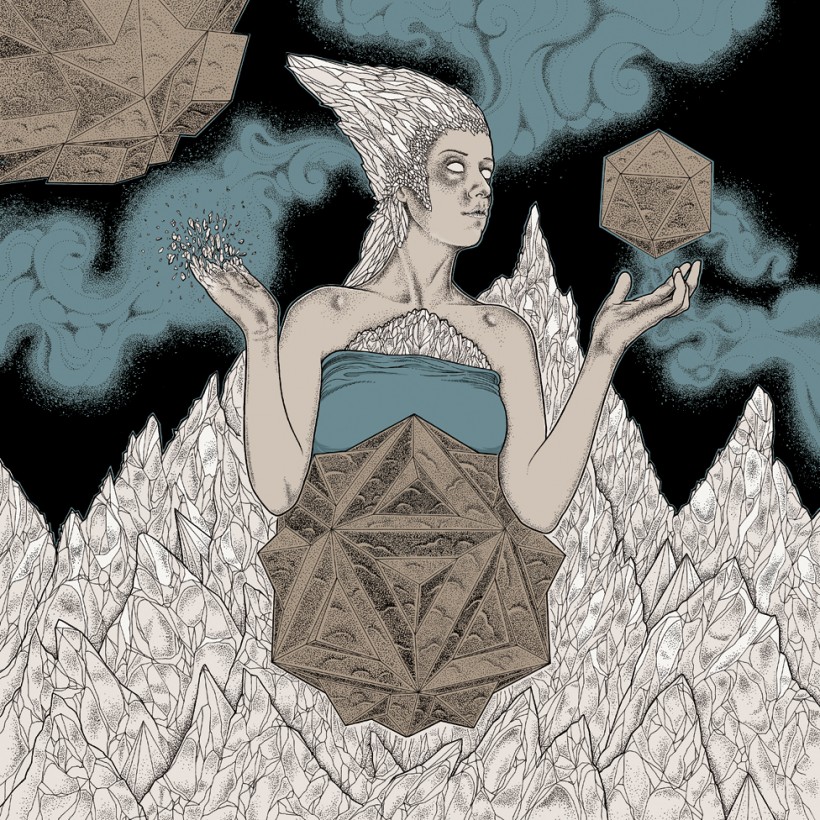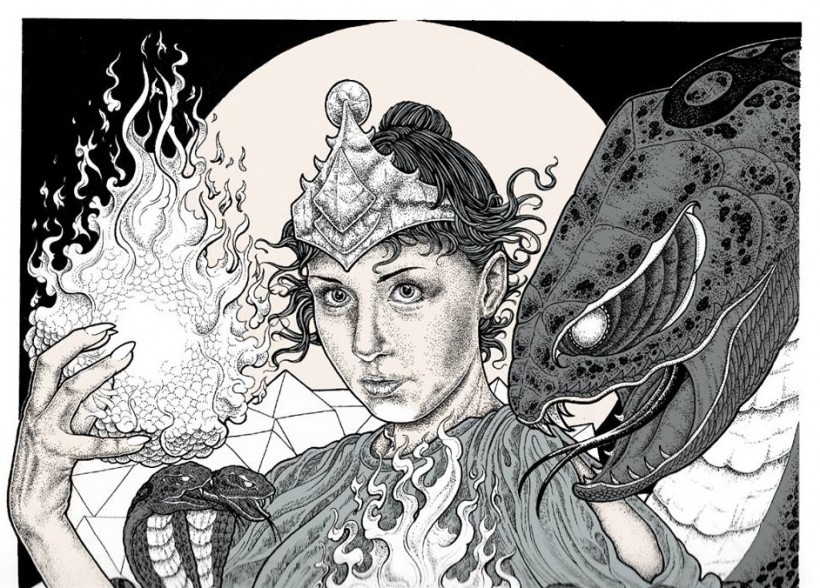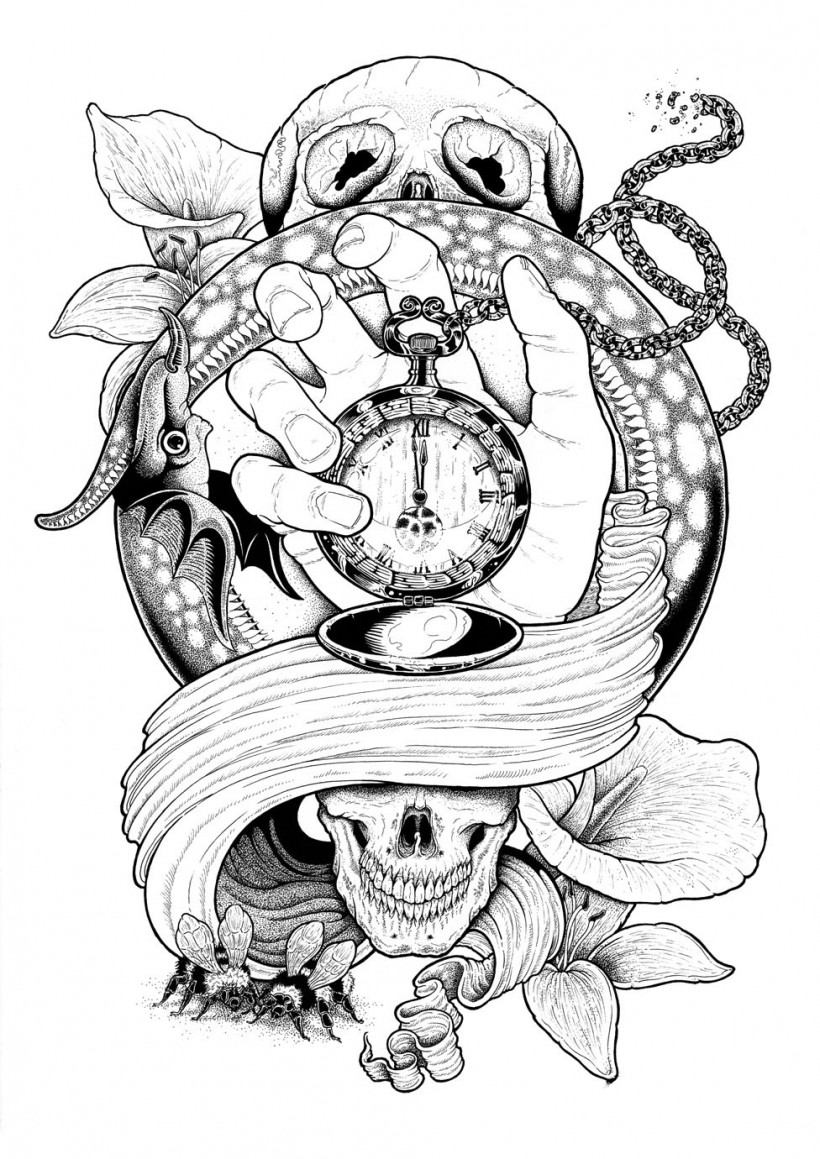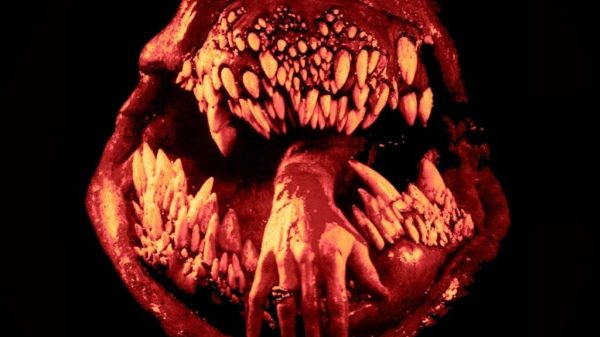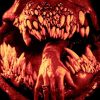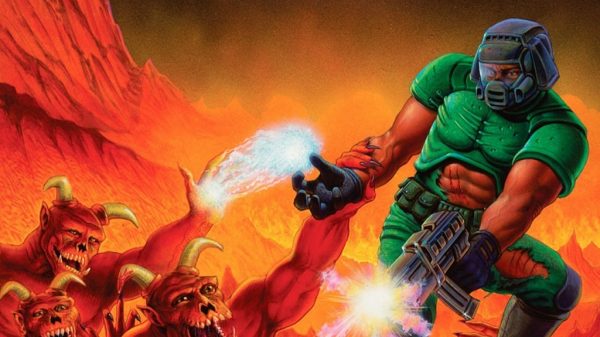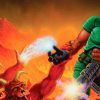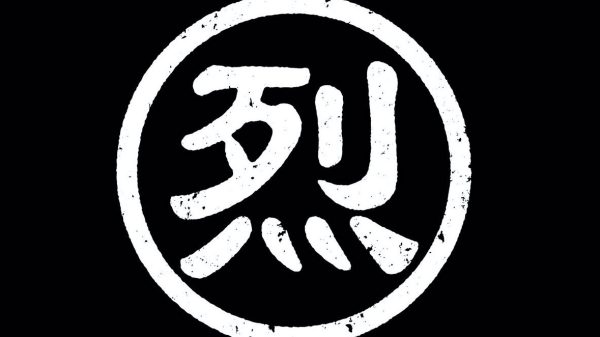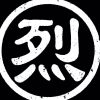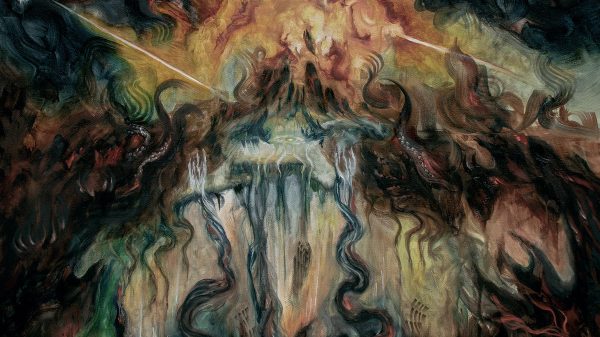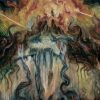Below is the interview I did with Jimbob Isaac of the exceptional Hark. Personally, I’ve been a fan of his work since the Taint days. And if you are unfamiliar with them, which is understandable – after all, they were an obscure gem – just think of Trouble; Dinosaur Jr., Rudimentary Peni, Lungfish, Cavity, Fläsket Brinner and Melvins; and you might have some idea about their fantastic music. Hark serves as a continuation of Taint’s legacy, maybe in another frame of mind. With this year’s “Crystalline”, Jimbob’s trademark screams and guitar work made a triumphant return to the metal world. But that’s no end to his art. Jimbob’s passion for Art Nouveau has resulted in a number of great drawings over the years, and I’ve included some, for your viewing pleasures (pains) in the end of the article. You can check out more at his website.
Ari Wilson: Hark has been touring Europe with KEN Mode in the past few days, and if I’m not mistaken, today marks the second day post tour. Tell me about it.
Jimbob Isaac: It’s great to be home, after a successful 3.5 week trek. The tour had a lot of laughs, great shows and hard graft on the road. There were many grueling hours, night drives and testing times. It was all worth it though.
Ari Wilson: Were there more old (Taint) fans among the audience or new (Hark) fans, overall?
Jimbob Isaac: That’s often hard to tell. A few folks in Taint shirts were seen, and some fans of both bands came to say hi. Generally though, it feels as though we’re all (each one of us) in a new phase. Scenes and people change, and you just have to stay in the present, enjoying each day as it comes.
Ari Wilson: Who came up with the idea of getting Hark and KEN Mode tour together? Knowing both the bands, it sounds like a perfect combination, on paper at least.
Jimbob Isaac: Well, Taint took KEN mode out on their first European tour in 2008. Jesse and I had been writing to each other since around 2005, so it’s been a long term friendship. Jesse was really supportive during my transition between Taint and Hark, and we talked about touring together even before the Mythopoeia 7″ was released. Despite being different bands, I think our sounds compliment each other well, as well as having many shared interests in terms of music, world view and sense of humour.
Ari Wilson: Now that you mentioned the transition between Taint and Hark, I think a lot of fans would want to know this: Why did you prefer to go for a new project rather than continuing as Taint? What I mean is usually bands that have got themselves a fanbase over the course of years, do not want to lose it even if they really want to go in a different direction, musically. Mastodon for instance.
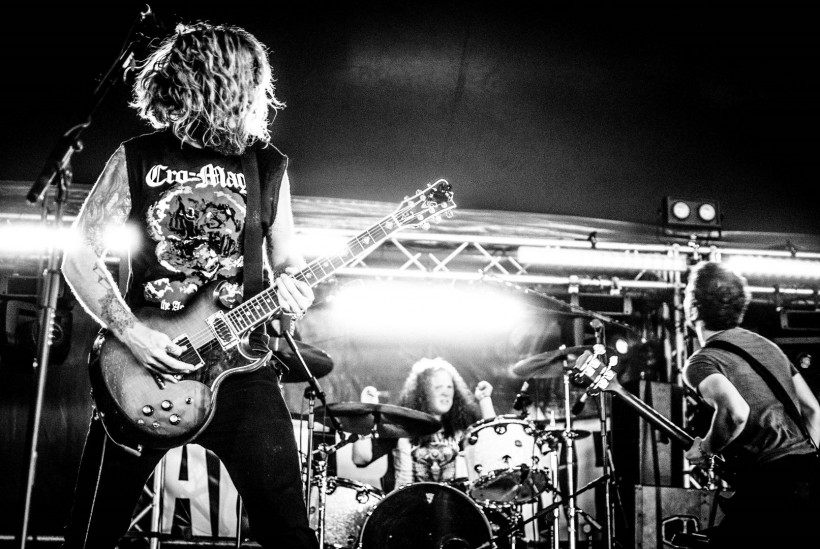 “Hark At Arctangent Festival 2014 (by Joe Harvatt)”
“Hark At Arctangent Festival 2014 (by Joe Harvatt)”
Jimbob Isaac: I felt that Taint had reached it’s creative limits, as well me being stifled by our intrinsic inability to tour. Rehearsals and writing were becoming slow again, after our busiest and most productive period, from the writing of ‘…Nova Roma’ to ‘Secrets & Lies’. The guys were focusing on home life, while I wanted to keep the momentum up that we’d gained. I also wanted closure on the Taint entity, and to create a new period in my life. I think the risk in of itself, was one I had to take. To keep ploughing the same, frustrating path would have been like creative suicide. No matter how tough the gamble has been, it was worth it. Believe me, I’ve undergone some deep personal changes and gone to some dark places, but I will always stand by my decision to make such a big change. I don’t think Mastodon have changed direction in any drastic way, I think that they’ve forged a steady and progressive path throughout their career. I think that their direction makes sense, and personally I’m a fan of what they do today, as well as their back catalogue.
Ari Wilson: While I’ll have to disagree with you on Mastodon, I must say I really respect a musician like you, who’s willing to risk almost everything for his chosen path. I’ve got one more question about the transition here: In what ways exactly is Hark different to you from Taint? Like if you write a riff today, will it be challenging to tell if it’s to be used for Taint or Hark if the two bands coexisted?
Jimbob Isaac: Both Taint and Hark had/have a collective approach. Even if I brought the majority of riffs to the table in both bands, the bands as a whole were responsible for the arrangement and feel of each song. So, the difference lies in the fact that each band is it’s own separate entity. I can’t imagine both bands existing simultaneously, as I think I’m a one-band guy.
Ari Wilson: Does that make Hark more of a live band or a studio band?
Jimbob Isaac: For me, any band that’s worth it’s salt, has to be a live band. A good live band should always make a good record. Live comes first for me. The collective approach manifests itself in the writing process. That is what creates a truer, more unique voice. Once that is honed, the band will be a unique live proposition, as well as the records that it creates.
Ari Wilson: Speaking studio, how do you deal with a producer? How much freedom does he have over the final sound?
Jimbob Isaac: I’ve never worked with a producer, per se. I’ve worked with engineers who have taken a co-production role, where both he and the band decide on the tones and how they are captured. No one has ever had any influence on song structure, in the way that a traditional producer’s role allows. Gethin Pearson, who engineered and co-produced ‘Crystalline’ contributed to the vocal treatment mostly, as well as some guitar tones. His contributions in those areas, ran in tandem with the vision we had for how the record was to sound.
Ari Wilson: No wonder both Taint and Hark have always sounded like nothing but themselves.
Jimbob Isaac: Thanks, that’s good to hear.
Ari Wilson: How was working with Neil Fallon for ‘Clear Light Of…’?
Jimbob Isaac: Neil tracked his vocals remotely, at his home studio. It came about after Clutch took Hark out on a two week European tour, just as our 7″ was released. Neil commented on the song, and how he loved the end section. Apparently it reminded him of King Crimson. His comments came to mind, when I was tracking my vocals during the “Crystalline” session. So, I emailed him and asked if would be into the guest spot. He replied with a resounding ‘yes’ and sounded really enthused about contributing. So, it was a smooth process, and he nailed it in one take. It means a lot to me, as I’ve been friends with those guys since the early days of Taint, from around ’96/’97 onwards. They’re the coolest guys, and ongoing role models to this day.
Ari Wilson: Vocally, and besides Neil, who are some of the musicians that have influenced you most?
Jimbob Isaac: Man, I grew up on the Beastie Boys, Run DMC, Led Zeppelin and AC/DC…So many to chose from. Neil’s vocals on the first two Clutch records really impacted on me, as well as other mid-90s bands like Tool, Quicksand, Fudge Tunnel and Helmet. Those bands, along with my metal favourites, like Sepultura and Pantera, all had a huge effect on me, vocally and musically.
Ari Wilson: How about telling us a bit about your rig? Especially the effects and the pedals.
Jimbob Isaac: My pedals are in constant flux. They are also a fairly reliable source for technical frustrations and mishaps. I like to write with them, and integrate them in to the texture of a song, rather than adding them for random or gimmicky effect. Amps wise, I’ll always go for the organic tones of a tube amp. I’ve been using my Matamp GTL for around 15 years now, and have just combined it with an Orange RV50. It’s a great combination. I’m not one for high gain, metal machines.
Ari Wilson: And the guitars?
Jimbob Isaac: I grew up playing Squire stratocasters, being the affordable start guitar that parents usually go for. I then moved on to Gibson SGs, the first of which was stolen when Taint opened for Clutch in around 2001. My follow up ’78 SG served me well, before First Act and Wild Customs since offered me endorsements. The Wild is really new, and is a great guitar. Their build quality is up there with Gibson custom shop, and I’m more than happy to support the company. They’re a small operation, based in the South-East of France. They’re all very like minded people to myself, and I’m a proud flag bearer of the Wild Customs brand.
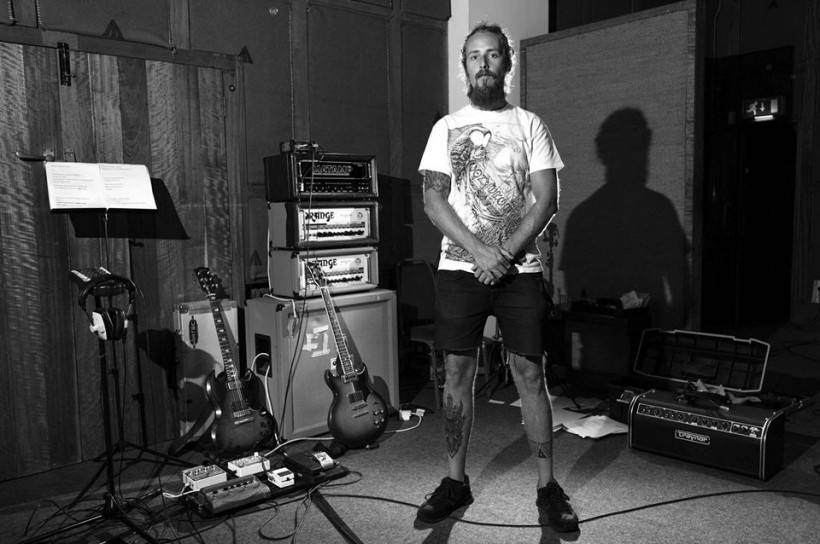 “Jimbob Isaac In Monnow Valley Studios (by Richard Isaac)”
“Jimbob Isaac In Monnow Valley Studios (by Richard Isaac)”
Ari Wilson: It’s often said that God resides in the details. But I believe I’ve heard the same thing about the Devil! So in either case, pardon me for going too far here. Having known you as a friend, I often think of you as not touchy about these subjects like Josh Homme. So, would you tell us also about the strings?
Jimbob Isaac: Haha, sure. I use 12 to 54 on the First Act, and 13 to 58 on the Wild Customs. Different neck tensions require different gauges, when tuning to standard C sharp.
Ari Wilson: Apart from standard C#, what other tunings have you played in, so far? Any particular reason or story behind any of those?
Jimbob Isaac: Apart from the occasional drop to B or A, I like to keep things fairly traditional with the C sharp standard. I guess it’s my classic rock upbringing, and the the desire to avoid certain trends in drop tuning, if possible.
Ari Wilson: Would that be the actual dropped A (AEADF#B), the Neurosis-dropped A, like everything the same as open D suspended fourth chord (DADGAD) (AKA Celtic tuning) with the exception of the sixth string (A), or some other variation of your own?
Jimbob Isaac: That could be the tuning I’m thinking of, although I’m severely un-schooled with actual tuning knowledge and chords. I’ll be honest, I can’t even remember what all the strings are called. I studied guitar for a year and a half, when I was 11 years old. I learned Spanish acoustic, and how to sight read and finger pick. Once the year and a half came up, I stopped the lessons as was tired of my tutor not teaching me rock and metal. I taught myself from then on, by ear and gradually forgetting how to sight read, and most other stuff. I don’t write tab for anything, and just write and practice my stuff with repetition.
Ari Wilson: It’s more or less the same with me, Jimbob!
Jimbob Isaac: Haha, cool!
Ari Wilson: In Hark, which one of you three writes the lyrics? Or maybe it is not one person, and the collective approach expands to the lyrics too?
Jimbob Isaac: I’m the only lyricist in Hark, as it’s a pure expression for me. I need to be the one writing the words that I’ll end up singing many, many times over. It’s equally a cathartic and creative outlet for me.
Ari Wilson: You said cathartic – that’s interesting, because most modernist/postmodernist art has nothing to do with catharsis, the concept introduced by Aristotle, and it usually leaves the audience in a state of confusion, rather than profound insight. Then, let me ask you, as I’ve been always skeptic if the concept had ever been functional, that how confident are you a Hark listener experiences such a change after a song ends?
Jimbob Isaac: I think there’s always room for catharsis, in modernist/post-moderist times. A lot of creative culture is so trend based, and arguably vacuous that I feel there’s more room for truly cathartic content ever more so, these days.That’s not to say I don’t want our audience to make their own minds up about my lyrical content. I don’t want to tell our listeners how to listen to us, or how to interpret us even. Art should always pose a question, and open doors for new questions to be made. I feel like the fragmented, stream of consciousness nature of my writing, lends itself well to the ongoing questions that our audience are welcome to ask. Art is a participatory process, and I don’t want full stops and dead ends to hamper our audience’s experience of Hark’s music and lyrics.
Ari Wilson: Speaking of stream of consciousness, have there been any literary influences on your work? And can you tell us what inspires you when writing the lyrics to a song, and has the instrumental side of a song ever restricted you when picking up words and so on?
Jimbob Isaac: Sure, I’m a fan of authors like Cormac McCarthy, Charles Bukowski, George Orwell and Will Self. For lyricists that have been huge influences, I have to credit Neil Fallon (Clutch), Mike Williams (Eyehategod) and Johnny Morrow (Iron Monkey) for the visual worlds they create. As for what inspires me for any particular song, well there’s no definite source or process that can help me identify that. Perhaps life’s own natural chaos determines what I’ll put into any given song. It’s a tacit, feeling process. The instrumental side of the song has never restricted me, but it certainly provides another layer of variables and parameters within which I’m able to construct the words. Something that a friend picked up on recently, was that he had read the a few lines from ‘Crystalline’ and suggested that the ancient Egyptian gods are talking through me, whether I realise it or not. I don’t want to be a skeptic, or be rude to my friend, but I’m not too inclined to believe that this is the case. He referenced a few things that were uncannily close, so I’ll remain quietly open minded to any such possibilities.
Ari Wilson: I know you’re into free jazz and the avant-garde in general, so have you ever thought of a project with a focus on things different?
Jimbob Isaac: Sure, I’d love to broaden my experience in to creating some kind of free-form project. I’m a fan of various jazz and electronic artists, so who knows, maybe some kind of project that differed a lot from my usual work would be fun.
Ari Wilson: How long have you been drawing, Jimbob?
Jimbob Isaac: I drew as a kid, until 16 years old. Then I followed the digital/design career from 16 until 31 years old. I’ve been drawing properly now for only the past 6 years. I’ve come full circle, as I’m using the pens that I trained with in College 20 years ago. I have some catching up to do, in terms of finding my thematic voice and developing my visual technique, but it’s very rewarding to have sunk my teeth into this. I took a big gamble, leaving the corporate design world and the financial security that those jobs provide, but I’m glad to have taken that risk.
Ari Wilson: Any favorite artists that might have influenced your work?
Jimbob Isaac: I studied technical drawing in college, using Rotring pens. It feels right for me to be using Rotrings once again, and to include the geometric and isometric influences in my art, that I learned during that time. Combining these influences, with my life-long love of Alphonse Mucha, whom I discovered for the first time in 1994, is the most honest combination of influences that I can put together. Sure, there is somewhat of a current movement, where artists are combining similar motifs, but I at least feel as though I have a legitimate stake in this movement.
Ari Wilson: Animals hold an especial place in the works you’ve done. Do you necessarily think of them as symbols; or of your work as a whole, symbolic?
Jimbob Isaac: Animals represent the purity and innocence that human nature lacks. They feature in my work, to represent a certain amount of yearning that I have for a more humble, honest existence. While human existence has always been corruptible, I feel that the information age is driving us even further away from our true nature. While I utilise tools as much as the next man, I can’t help but wonder if I’d be happier living a far simpler life.
Ari Wilson: Are you still in touch with anyone from Black Eye Riot or Army Of Flying Robots, with both of whom you did split releases back in the 2000’s?
Jimbob Isaac: Yes, I’m long-time friends with the guys from Black Eye Riot and Army Of Flying Robots. The BER guys are ex-Acrimony and now in Sigiriya, and the AOFR guys play in a few bands around the Nottingham area.
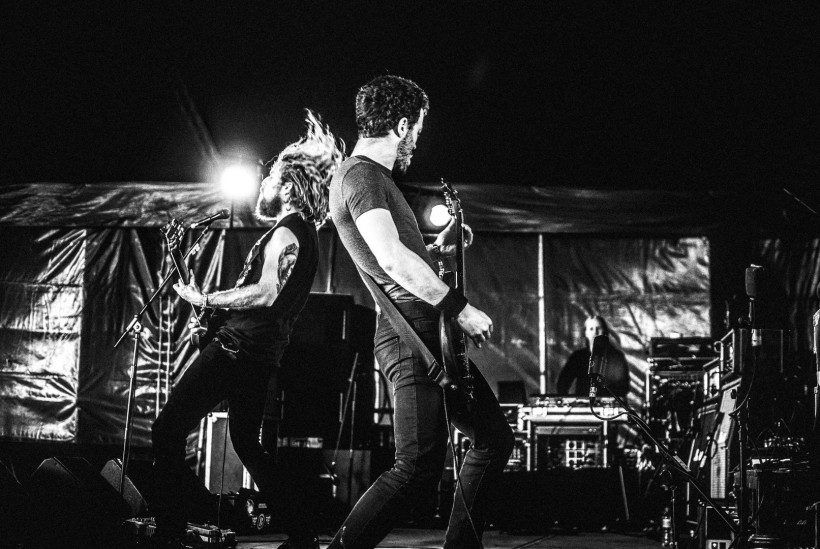 “Hark At Arctangent Festival 2014 (by Joe Harvatt)”
“Hark At Arctangent Festival 2014 (by Joe Harvatt)”
Ari Wilson: Some days earlier you jokingly said that Hark are weird. That could make sense to me in one more way other than you guys play an odd brand of metal. Your previous bandmates in Taint, Chris West and Alex Harries, haven’t been active in any other project before or after Taint. And the same goes for Simon Bonwick and Nikolai Ribnikov – your new bandmates in Hark, as it seems they weren’t really active anywhere before Hark happened. What’s the deal with that?!
Jimbob Isaac: Sure, I regard Hark as weird in terms of how specific and often segregated musical scenes can be. We combine influences in ways that I believe other bands don’t, and both Taint and Hark seem to be round pegs in square holes. To our detriment perhaps, but it further proves we’re not doing this for money, fame or popularity. Just honesty. Actually, Chris West was in Cardiff based doom band Diabolo before he joined Taint. Alex was only ever in Taint, apart from a few fun/summertime punk rock bands, back in the early/mid-90s. As for Nikolai and Simon, they were in a band called Whyteleaf before Hark.
Ari Wilson: Alrighty! I almost thought those ancient Egyptian gods go summon the perfect pairs for you, from nowhere!
Jimbob Isaac: Maybe they did!
Ari Wilson: So for the first of my last three questions: what is politics to you, Jimbob?
Jimbob Isaac: Politics are everywhere, and unavoidable.
Ari Wilson: Misfits or Ramones?
Jimbob Isaac: A bit of both.
Ari Wilson: Hark’s music often remains dramatic but not exaggerated. If you were to tell us about your philosophy of life, in a similar manner, as in one or two sentences, what would it be?
Jimbob Isaac: It would be to enjoy exploration, but not suffer from self-indulgence, and lack of self awareness. To reflect life’s complexities, but to counter them with space, breath and openness. To accept what has a solid appearance, is equally empty of any form. To ebb and flow, along with life’s obstacles, and recognise that you, yourself might be the biggest obstacle to overcome.
Ari Wilson: This has been quite a lengthy conversation, so I’d like to thank you for countering it with openness, and I hope you’ve enjoyed some of the probable self-explorations as I did , the exploration, into the mind of the brilliant artist that you are, Jimbob!
Jimbob Isaac: Great, thanks Ari!
A selection of some of the drawings done by Jimbob:
“Hark – Crystalline (Inlay Cover)”
“Ramla”
“Red Fang (Poster)”
“Hark – Monocryst”
Temples 2015 (detail)
“Momenta”


